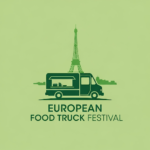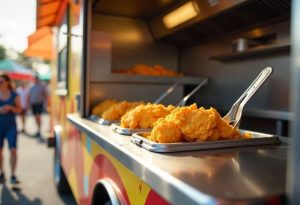Food Truck Heaven by European Food Truck Festival – The global urban dining landscape has been revolutionized by the increasing prevalence of food trucks, which has generated dynamic opportunities for food entrepreneurs and vibrant social centers for communities. A dedicated space that unites a diverse array of mobile food vendors under one structure or open sky is the concept of Food Truck Heaven, which is central to this evolution. This article investigates the essential business and operational considerations, variations, strategies to attract visitors and purveyors, and defining characteristics of Food Truck Heaven as a culinary destination.

Defining “Food Truck Heaven”
Food Truck Heaven is a new and enticing concept in the food service industry that has established a vibrant culinary destination that connects diverse food entrepreneurs with enthusiastic consumers. Success is contingent upon the cultivation of convenience, community, and variety, regardless of whether the venue is a permanent park, rotating center, or hybrid. A prospering ecosystem is established by the combination of operational excellence, effective marketing, and engagement efforts, which provide customers with an enriching dining experience and enable vendors to thrive. Food Truck Heaven serves as a beacon for the future of communal dining as urban lifestyles adopt casual, accessible, and diverse food options.
The Concept of Food Truck Heaven
Food Truck Heaven is a physical location that is designated as a food truck park, food truck center, or culinary incubator at its most basic level. It is typically located in a spacious outdoor area or a specially designed venue and is home to a variety of food trucks, either on a permanent basis or through a rotating array.
In response to the increasing demand for varied, convenient, and high-quality street cuisine experiences, this concept has been developed. Food Truck Heaven transforms the urban food scene into a vibrant destination that promotes social interaction, culinary exploration, and community building by centralizing numerous food trucks in a single, easily accessible location. Not only does the area function as a center for food enthusiasts, but it also frequently functions as a cultural hub, hosting events, games, and music to improve the overall experience.
Key Elements of Food Truck Heaven
There are several defining components that collectively form the identity of a Food Truck Heaven:
- Variety: A successful food truck park boasts an extensive range of cuisines and menu styles. These often include crowd-pleasers such as tacos, BBQ, vegan and vegetarian options, gourmet desserts, ethnic specialties, and fusion dishes. The culinary diversity ensures there is something for every palate, increasing appeal to a wide demographic.
- Community Engagement: Beyond just food, these spaces foster a sense of community by serving as venues for social gatherings, celebrations, and shared culinary experiences. They encourage interaction between patrons, vendors, and the local neighborhood, contributing to a lively atmosphere.
- Amenities: To optimize visitor comfort and satisfaction, Food Truck Heaven is typically equipped with essential amenities. These include ample seating areas (sometimes shaded), clean restroom facilities, live music or DJ setups, and occasionally bars or recreational spaces such as game zones or outdoor lounges.
Types of Food Truck Heavens
Food Truck Heaven is not a one-size-fits-all concept. Generally, there are three primary operational models, each offering different advantages and challenges.
The Permanent Food Truck Park
In this model, food trucks occupy long-term fixed spots within a dedicated area or lot. Vendors often invest in customizing their spaces and benefit from a consistent location and customer base.
- Pros: Stability in vendor schedules and parking; predictable customer traffic; shared infrastructure such as utilities, seating, restrooms, and waste disposal; opportunities for cohesive branding and marketing of the park itself.
- Examples: Many urban and suburban areas have embraced permanent food truck parks as communal dining spaces and local attractions. These parks often serve as regular meet-up spots for families, professionals, and tourists alike.
The Rotating Food Truck Hub
This model focuses on a dynamic, rotating roster of food trucks that change daily or weekly. These hubs often appear in business districts, event venues, or central plazas.
- Pros: Fresh and varied food options for repeat visitors; attracts a wider variety of vendors including seasonal and niche offerings; maintains high consumer interest through novelty.
- Examples: Corporate campuses frequently host rotating food truck lunches, while city squares may feature daily food truck gatherings tied to festivals or markets.
The Hybrid Model of Food Truck Heaven
Balancing the benefits of both approaches, the hybrid model maintains a core group of permanent food trucks supplemented by rotating guest vendors.
- Pros: Delivers both consistency for loyal patrons and new options to keep interest alive; broadens vendor exposure while maintaining a dependable shopping environment.
Attracting Visitors & Vendors
For Food Truck Heaven to thrive, strategic marketing and enhanced customer experience are paramount.
Marketing Strategy
- Social Media: Leveraging platforms like Instagram and TikTok with well-curated photos and videos showcasing mouthwatering dishes, the park’s ambiance, and ongoing events is essential to capturing attention and building a fan base.
- Website & App: Maintaining a professional, mobile-friendly website with real-time updates on vendor lineups, menus, and special event calendars greatly improves customer convenience and repeat visitation.
Enhancing the Experience
- Events: Hosting live music performances, trivia nights, family-friendly activities, and seasonal festivals transforms the space from a dining area into an entertainment destination, increasing dwell time and revenue potential.
- Partnerships: Collaborations with local breweries, distilleries, artisan vendors, or non-profit organizations enable cross-promotion and diversify offerings with beverages or merchandise.
- Customer Amenities: Comfortable seating options, adequate shade structures, clean restrooms, and attentiveness to cleanliness and safety encourage visitors to linger, enhancing satisfaction and sales.
Business and Operational Aspects
Sustaining a Food Truck Heaven involves multiple revenue streams and meticulous operational planning.
Revenue Streams
- Vendor Fees: The primary income is often derived from leasing spaces to food trucks on a daily, weekly, or monthly basis. Fees vary depending on location, foot traffic, and services offered.
- Ancillary Sales: Supplementing food offerings with sales of beverages (soft drinks, craft beer, wine), branded merchandise, or tickets for special events diversifies income sources.
- Space Rental: Renting the venue for private parties, corporate functions, or community events can provide lucrative revenue and build strong community ties.
Infrastructure Requirements
- Utilities: Reliable access to electricity (or powerful generators), potable water, gas hookups, and waste disposal facilities is critical to vendor operations and compliance with health codes.
- Zoning and Permits: Securing the relevant permits and ensuring zoning compliance are foundational to legally operating a food truck park. This includes health department approvals, fire safety inspections, and municipal authorizations.
- Maintenance: Consistent cleaning, security measures, and general upkeep foster a safe and attractive environment, imperative for retaining vendors and attracting visitors.



